Put another way, I was driven . . . not merely by the fact that I “know” these things, but rather by the fascination and passion that drove me to learn about them in the first place.
With last week’s Professional Wednesday post, I began what I expect will be a multi-week conversation about the age-old writing advice, “Write what you know.” In that entry, I pointed out that “Write what you know” can be overly limiting, or, if thought of in the right way, can speak to exactly the sort of mining of our emotional experience that will enrich our narratives and character work.
Today, I would like to focus on “write what you know” as a tool in world building and plotting.
Let me start this way:
 As many of you know, my first series, the LonTobyn Chronicle, had as its narrative core, a magic system in which mages formed psychic, magical bonds with birds of prey: hawks, owls, eagles. To this day, fans of the series mention those relationships between mages and their avian familiars, as the element of the books they enjoyed most.
As many of you know, my first series, the LonTobyn Chronicle, had as its narrative core, a magic system in which mages formed psychic, magical bonds with birds of prey: hawks, owls, eagles. To this day, fans of the series mention those relationships between mages and their avian familiars, as the element of the books they enjoyed most.
What you may not know is that I have been an avid bird watcher for more than fifty years (yes, you read that right: 50 years), since I was a small boy.
Nearly all my readers are familiar with my Thieftaker Chronicles, a historical fantasy series set in pre-Revolutionary Boston. Some of you may not know that I not only love history, I also studied it extensively and have a Ph.D. in U.S. history from Stanford.
I’m not the only one who does this. I am a huge fan of the work of Guy Gavriel Kay, and perhaps you are as well. Maybe, you have read enough of his books to notice how many of his significant characters are physicians. As it happens, so was Kay’s father. He grew up in a household in which the study and practice of medicine were paramount.
I’m sure you see where I’m going with this. But I want to be equally clear about where I am NOT going. I didn’t come to the LonTobyn books, my first fiction venture, thinking “I have to ‘write what I know,’ and therefore I am going to create a world with a bird-based magic system.” Rather, I came up with the idea for the books organically. I love birds. I have always been fascinated by raptors. And at some point, it simply occurred to me that a magic system built around hawks and owls would be incredibly cool.
My choice with respect to the Thieftaker books was somewhat more deliberate. I originally conceived them as alternate-world fantasies. My editor at the time urged me to think about a historical approach instead, citing my history background. He suggested I set the books in London. And at that point I thought, “if I’m going to draw on my history background, why not do it right and set the books in the New World, whose history I know so well?”
Put another way, I was driven to write my books about hawks and about history not merely by the fact that I “know” these things, but rather by the fascination and passion that drove me to learn about them in the first place.
Again, I am far from unique in this regard. I know writers who love music and who have used it as the basis for their magic systems. I have a friend, whose family history is tied intimately to the devastation of Europe’s Jewish population by Nazism, who has written an incredibly powerful fantasy series set in Nazi-ravaged Europe. Another friend, who is a brilliant writer and editor, based her magic system literally on the written word, on the commitment of spells to vellum. And yet another friend, who is dyslexic, imparted that same trait to his lead character.
I don’t believe any of them “wrote what they know” to satisfy some arcane requirement of our profession. Rather, they came up with fiction ideas that reflected their loves and interests, their emotional pasts or that of their families, their very reality in all its complexity.
And there is no reason you can’t do the same. “Write what you know” doesn’t have to constrain us, nor does it necessarily force us in certain directions. It offers us opportunities. “Where do your ideas come from?” I’m asked this all the time, and always I respond the same way: Ideas are everywhere. We encounter them daily, though at the time we don’t always recognize the encounters for what they are. Robert Frost once said “An idea is a feat of association.” Our hobbies, our professions, our loves (and perhaps even our hates), our educational backgrounds, our family backgrounds, our emotional and physical battles and achievements — any and all of these can point us in the direction of a new story, a new character, a new world.
My point being that we don’t have to struggle to come up with ideas. Often they’re sitting right in front of us, waiting for that “feat of association,” that magical (pun intended) moment when “Where do your ideas come from?” meets “Write what you know.”
Keep writing!!









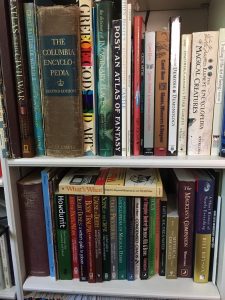 These are books I turn to again and again during the course of my work, and I expect the writer on your list will do the same. Not all of them are easy to find, but I assure you, they’re worth the effort. So here is a partial list:
These are books I turn to again and again during the course of my work, and I expect the writer on your list will do the same. Not all of them are easy to find, but I assure you, they’re worth the effort. So here is a partial list: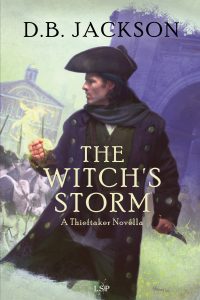 DBJ: Well, I suppose I should point out that while I haven’t written a Thieftaker novel in some time, I have been writing and publishing Thieftaker-universe short stories almost yearly since that last novel came out. But this was a far more demanding project and honestly, I enjoyed it immensely. I love these characters — not only Ethan, but also his nemesis, Sephira Pryce; his love, Kannice Lester; his mentor, Janna Windcatcher; his closest friend, Diver Jervis; and a host of historical figures including Samuel and John Adams, Joseph Warren, Stephen Greenleaf, and others. All of them are here in these new stories. But I have also brought in new characters: a new set of villains and some new allies as well. So for me as a writer, there was enough here that was familiar to make me feel like I was reconnecting with old friends, but there was also enough innovation for the plot lines and character interactions to feel fresh and exciting. I hope my readers agree!
DBJ: Well, I suppose I should point out that while I haven’t written a Thieftaker novel in some time, I have been writing and publishing Thieftaker-universe short stories almost yearly since that last novel came out. But this was a far more demanding project and honestly, I enjoyed it immensely. I love these characters — not only Ethan, but also his nemesis, Sephira Pryce; his love, Kannice Lester; his mentor, Janna Windcatcher; his closest friend, Diver Jervis; and a host of historical figures including Samuel and John Adams, Joseph Warren, Stephen Greenleaf, and others. All of them are here in these new stories. But I have also brought in new characters: a new set of villains and some new allies as well. So for me as a writer, there was enough here that was familiar to make me feel like I was reconnecting with old friends, but there was also enough innovation for the plot lines and character interactions to feel fresh and exciting. I hope my readers agree!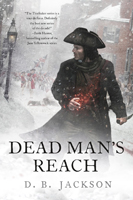 DBJ: There was a lot to work with actually. On the one hand, the trials of the soldiers and their captain were a huge deal. Think of all the big trials we’ve had in recent history — the way they captivate the public — and then magnify that about a hundred times. The Boston Massacre was a huge, huge deal throughout the colonies, but in Boston in particular. It’s easy to forget that the population of the city was only about 15,000 at this time. So while “only” five people died that night in March, chances are that if you lived in Boston, you’d had some contact with at least one of the victims. Add to that the fraught political climate of the time and you have a recipe for a lot of tension. Plus, as the title of the first novella suggests, right before the trial began, Boston was hit by a hurricane. Now, I have adopted the storm for my own narrative purposes and added a magical element. But the fact is, there was a ton going on, historically speaking, and I was able to work most of it into the novellas.
DBJ: There was a lot to work with actually. On the one hand, the trials of the soldiers and their captain were a huge deal. Think of all the big trials we’ve had in recent history — the way they captivate the public — and then magnify that about a hundred times. The Boston Massacre was a huge, huge deal throughout the colonies, but in Boston in particular. It’s easy to forget that the population of the city was only about 15,000 at this time. So while “only” five people died that night in March, chances are that if you lived in Boston, you’d had some contact with at least one of the victims. Add to that the fraught political climate of the time and you have a recipe for a lot of tension. Plus, as the title of the first novella suggests, right before the trial began, Boston was hit by a hurricane. Now, I have adopted the storm for my own narrative purposes and added a magical element. But the fact is, there was a ton going on, historically speaking, and I was able to work most of it into the novellas.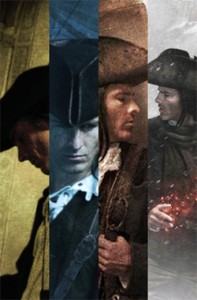 DBJ: Definitely. The fact is, I’m probably better known for Thieftaker than I am for anything else I’ve published, either as D.B. Jackson or as
DBJ: Definitely. The fact is, I’m probably better known for Thieftaker than I am for anything else I’ve published, either as D.B. Jackson or as 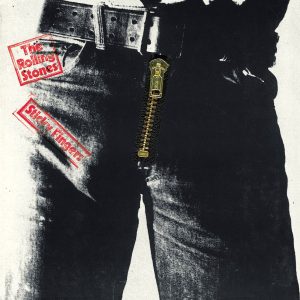 Music isn’t meant to be sold song by song. We’re supposed to buy albums. We’re supposed to put up with the bad songs in order to enjoy the good ones. That makes the listening experience better. For every “Eleanor Rigby” and “For No One” we should have to endure a “Doctor Robert.” For every “Brown Sugar” and “Can’t You Hear Me Knockin’?” we should have to suffer through a “You Gotta Move.” It’s only fair. No one is entitled to a perfect listening experience, and songwriters deserve the chance to have their crappy songs heard alongside the good ones. This is America, damnit!
Music isn’t meant to be sold song by song. We’re supposed to buy albums. We’re supposed to put up with the bad songs in order to enjoy the good ones. That makes the listening experience better. For every “Eleanor Rigby” and “For No One” we should have to endure a “Doctor Robert.” For every “Brown Sugar” and “Can’t You Hear Me Knockin’?” we should have to suffer through a “You Gotta Move.” It’s only fair. No one is entitled to a perfect listening experience, and songwriters deserve the chance to have their crappy songs heard alongside the good ones. This is America, damnit!